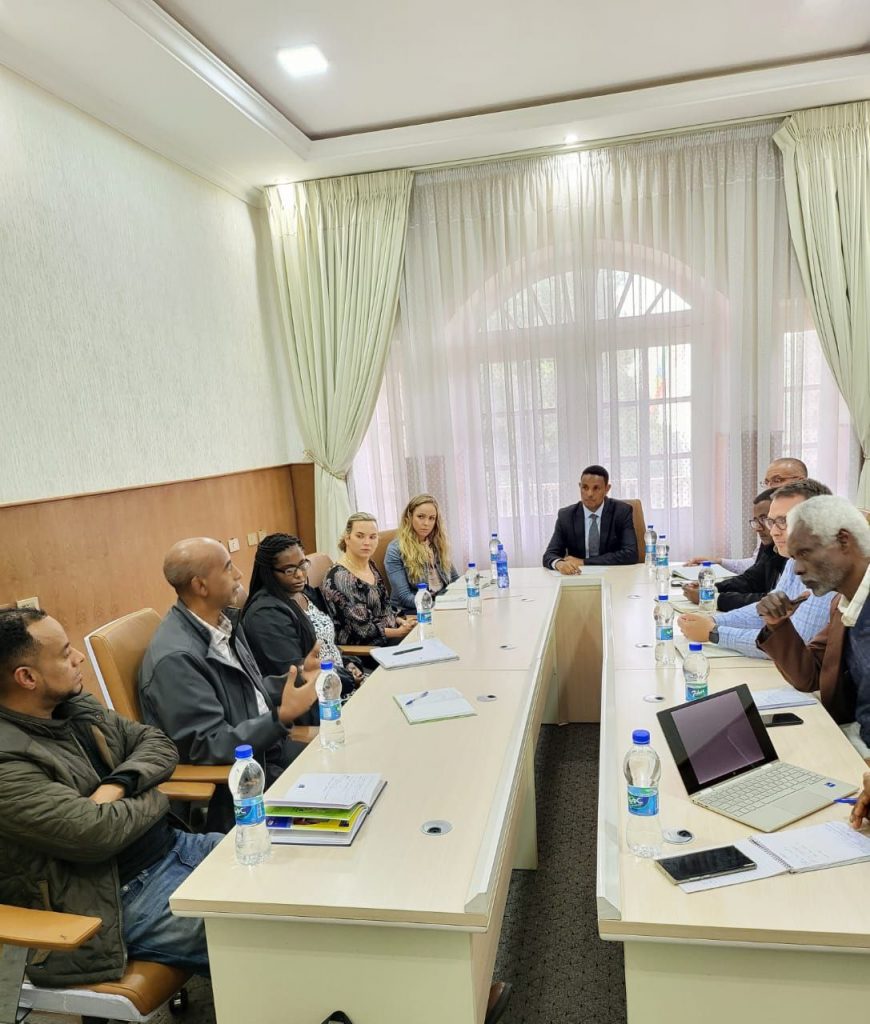The Ethiopian Public Health Institute and the Association of Public Health Laboratories, USA, vow to further strengthen their partnership and collaborations

Thursday, September 15,2022, Addis Ababa: The Director General of the Ethiopian Public Health Institute (EPHI), Dr Mesay Hailu and his team has met and held productive discussions with a visiting team of the Association of Public Health Laboratories (APHL) of the USA led by Ms. Sherrie Staley, Deputy Director of the Association’s Global Health Program. At a meeting held at the institute, Dr Mesay has warmly welcomed APHL’s team and expressed his appreciation and thanks for the longstanding partnership and collaborations between the two sister organizations and APHL’s impactful contributions to strengthening the capacity of the Ethiopian Health Laboratory System and improving the quality of its services. APHL is a non-profit membership organization in the United States representing governmental reference and referral testing local, state, county, and territorial public health laboratories. Currently, the Association, through its Global Health Program, is working with 30 countries worldwide in assisting them to strengthen their laboratory systems to effectively support responses to public health emergencies, clinical care services and public health researches.
The Association has been working with EPHI since 2004 as an implementing partner of CDC/PEPFAR in Ethiopia with particular focus on improving and strengthening the capacity of the laboratory system and services in the country. As part of its series of Cooperative Agreements made with CDC/PEPFAR over the past years, APHL has been collaborating and closely working with EPHI in the implementation of multiple laboratory programs through the provision of technical assistance and material support. Training and capacity building in laboratory leadership and management, biomedical engineering and laboratory equipment maintenance, laboratory quality management system, laboratory information and data management system, biosafety and biosecurity programs, and implementation of External Quality Assessment schemes were among the major support and collaboration areas with EPHI. Starting from 2016, APHL has been particularly supporting the training of Ethiopian Biomedical Medical Engineers by the Eagleson Institute of the USA in the installation, maintenance and certification of Biosafety Safety Cabinets (BSCs), a crucial capacity the country was totally lacking and was depending on annual procurement of the service from the Republic of South Africa. As a result, EPHI currently has six internationally certified Biomedical Engineers for the installation, maintenance and certification of BSCs. The Association has also supported the procurement and supply of the necessary equipment/tools for the certified engineers to capably undertake these activities in compliance with international requirements.
At the current high-level leadership meeting, both institutions have emphasized the importance of strengthening their collaborations and partnership going forward to further advance the capacity of the Ethiopian laboratory system for continued improvement in the quality of testing services it provides with utmost resilience and sustained reliable operation. In this regard, both have prioritized and agreed to focus on the following key activities:
- Complete the installations of two solar power generation systems at Gambella and Assossa Regional Reference Laboratories which are believed to sustainably alleviate interruption of testing services due to incidental line power outages. The two systems have already been received at EPHI and ready for delivery and installations at the selected sites.
- Continue supporting the the implementation of the National Biosafety Cabinets’ Maintenance and Certification Program. During its next project year which starts in October 2022, APHL is planning to provide support for the conduct of workshops on BSC Maintenance and Certification Program Management and technical refresher training for the certified Biomedical Engineers.
- Provide additional training on the Foundation of Laboratory Leadership and Management to laboratory facility directors and laboratory program managers working at the national and regional levels.
- Provide technical assistance for the standardization, integration and centralization of data generated by Antimicrobial Resistance (AMR) surveillance sites across the nation.
- Complete the recently initiated waste water surveillance for SARS-CoV-2 Pilot Project with plan for potential expansion to more sites based on the outcome of the pilot study.
- Continue supporting EPHI to enroll more selected sites into External Quality Assessment (EQA) scheme for SARS-CoV-2 Ag RDT through the procurement of the required Proficiency Testing (PT) panels.
- Provide support for building the capacity of EPHI in Next Generation Genomic Sequencing, mainly in the area of bioinformatics.
At the conclusion of the meeting, both leaderships have expressed their unwavering commitments to contributing their shares of responsibilities for the proper implementation of the agreed upon key activities as planned, continue their communications seizing all suitable opportunities and ways to appreciate successes and address challenges as they arise so as to ultimately ensure the successful achievement of the anticipated common goals.
